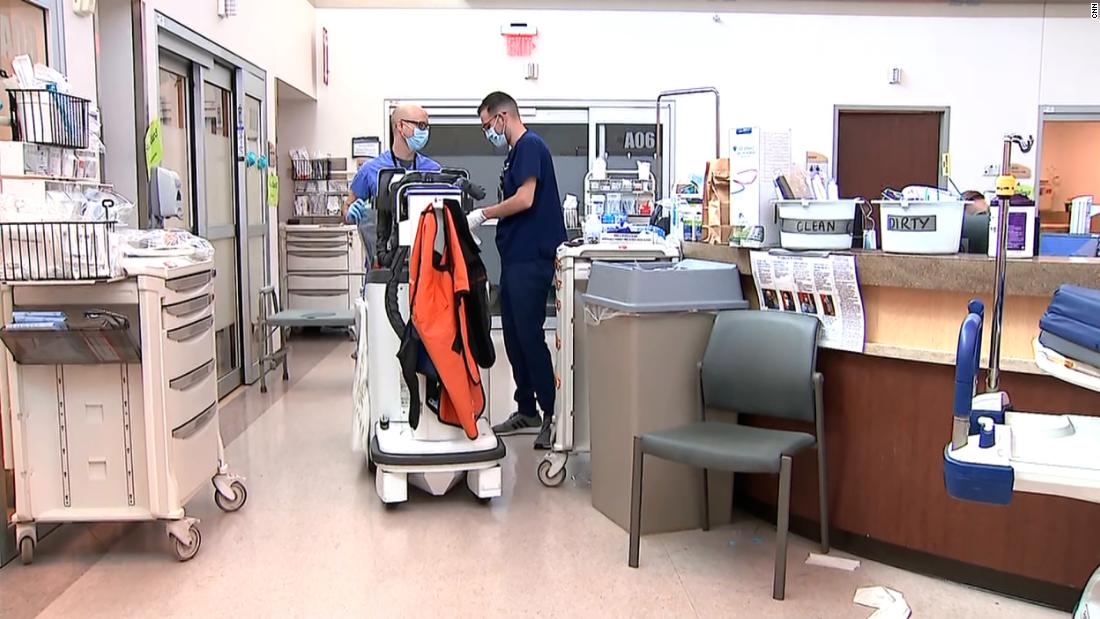(CNN) — In June, Louie Michael and his wife, Patti, were admitted as COVID-19 patients to Mercy Hospital in Springfield, one of two major hospitals in southwestern Missouri.
Pattie was hospitalized first. She has asthma and is immunosuppressed. Michael followed her the next day, arrived by ambulance.
He chronicled his fight against covid-19 on Facebook, sharing his health updates daily. «Breathing is difficult, it is difficult. This is real, ”said Michael.
Speaking to Springfield News-Leader, Michael said the couple never completely ruled out the vaccine, but they postponed the decision, hoping to see the results between the available vaccines.
Something they now regret.
“I hope people think about getting vaccinated. It is his prerogative, but I wish I had done it just to avoid this, “said Michael. “This new delta variant, which they think it might have had, is just plummeting everyone who didn’t catch the other before.”
Missouri is experiencing a worrying increase in hospitalizations due to the delta variant of the coronavirus, which originated in India. In Springfield alone, there has been a 225% increase in hospital admissions since June 1, according to the Springfield-Greene County Health Department.
The delta variant, which has been found to be more communicable than others, now accounts for about 29% of cases in Missouri, more than in any other state, according to data from the US Centers for Disease Control and Prevention. . (CDC).
And vaccination rates in Missouri remain below average, CDC data shows. About 38% of the state’s population is fully vaccinated, compared to nearly 46% of the general US population.
Scope of vaccines
With Springfield having less than 38% of people fully vaccinated, health officials are turning to creative approaches to gain the trust of the community.
The health clinics in conjunction with the Springfield-Greene County Health Department have hosted vaccination clinics at fire stations, LGBTQ + community centers, and a local Juneteenth celebration. Local breweries have also hosted recurring events where attendees can get a free drink and beer, motivation for some.
“I really have no answer other than that I was afraid of something new,” Will Branch said.
An arborist by profession, Branch, 37, said his family had been careful about quarantine during the pandemic. Branch and his wife, Gina, in part, wanted to stay safe, since one of their two young children is a heart patient.
«I barely had time to come to get vaccinated. I’m definitely not going to have time to be in the hospital, ”Branch said.
Those hospitalized are now younger than those affected during the winter surge.
“People in their teens and early 20s are being hospitalized and need ventilators,” said Katie Towns, acting director of the Springfield-Greene County Health Department.
The investment in the spread of the variants is clearly reflected in the data, according to county health officials, as explained earlier in the week during a news conference.
“If you go back to mid-May, what we saw was a delta variant at 70% and an alpha variant at about 24%. In June, the last three weeks, that has changed a lot to the delta variant at 93% and only 7% alpha. That change was likely the cause of a surge within our hospital systems, ”said Kendra Findley, community health and epidemiology manager for the Springfield-Greene County Health Department.
More than half of those admitted to the two major Springfield area hospitals come from surrounding counties with limited health clinics. Each of those counties has complete vaccination rates below 20%. The national average is more than double that number, at 46%.
Dr. Robin Trotman, an infectious disease expert at CoxHealth, is witnessing this rise firsthand in hospitals.
“Almost 100% of people hospitalized with covid pneumonia are not vaccinated. We have now vaccinated people who test positive but do not get seriously ill, “Trotman said.
For nurses, doctors and respiratory therapists on the front lines of the pandemic, it is a bewildering picture.
“When staff put themselves at risk in these situations, and they feel like other people are unwilling to get vaccinated, despite the risk, it’s hard for some to swallow,” Trotman said.
CNN’s Deidre McPhillips contributed to this report.
–


